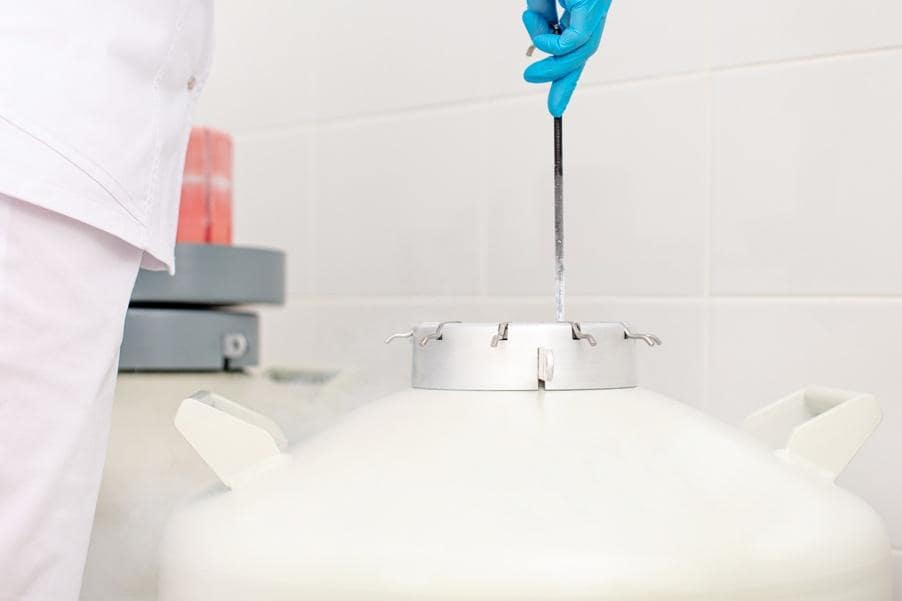HIGHLIGHTS
20 December 2020
5 yoga poses for couples to Enhance your relationship with your partner, level up your happiness in bed.
READ MORE20 December 2020
7 the procedure takes care of yourself and the wife before collecting eggs-collecting sperm.
READ MORE20 December 2020
Protein, a key nutrient of a woman, preparation for pregnancy- preparation for an egg collection.
READ MORE
Why Is It Important for a Health Check Up for Both Male and Female Before Getting Pregnant?
READ MORE
Destination IVF: Why Bangkok is a Premier Choice for International Patients Seeking Fertility Treatment
READ MOREHow Long Can Frozen Eggs Be Stored?
 21 Oct 2022
21 Oct 2022

With modern-day advancements in the field of reproduction, people are now opting to have children later in life. Fertility in both men and women declines as we age. For women, in particular, fertility tends to peak around the late teens to late 20s, while the rate of decline is more pronounced once they hit their mid-30s.
Many that choose to delay childbearing may opt to freeze their eggs earlier on in life. This is because waiting too long will not only mean having fewer eggs at their disposal but also lower-quality eggs.
Women are born with their lifetime supply of eggs. The number of eggs, therefore, declines each menstruation cycle. As the overall number of eggs declines, so too does the egg quality. It is noteworthy that declining egg quality also tends to result in a higher likelihood of genetic abnormalities in embryos. Older women tend to have eggs that have either too many or too few chromosomes which can lead to genetic abnormalities like Downs syndrome.
So, for women that have consulted their doctor or are otherwise aware of the increased risks that come with delaying childbearing, but still want to have a healthy biological child of their own, egg freezing becomes a serious consideration.
What is egg freezing?
Egg freezing is a means of fertility preservation that a woman can undergo to allow them better chances of bearing a healthy biological child later in life. It is typically undertaken as a part of the in vitro fertilisation (IVF) process, but also be carried out independently to await later fertility treatment.
During IVF, the woman is prescribed fertility medications that will stimulate the production of multiple eggs from the ovaries. Once the eggs have matured, they are retrieved through such procedures as transvaginal ultrasound aspiration. The retrieved eggs are then placed in a nutritive liquid or culture medium and incubated.
If the eggs are not to be fertilised at that time, they can be cryogenically preserved for future use. The eggs are frozen at -196° to ensure the cells do not degrade. These days, some women freeze their eggs even in their 20s. So why this growing trend?
Why are women freezing their eggs?
One of the key reasons women are opting to freeze their eggs is the knowledge that the older they get, the more their quality and the number of eggs produced will decline. Knowing that they will likely want children later in life, they opt to freeze eggs when younger so they have better chances of having a healthy child in future.
IVF doctors have successfully helped women get pregnant after having had their eggs stored for as long as 14 years, meaning that as long as they are correctly preserved, there is no real time limit on when the eggs may be used.
The delay is often due to a desire to pursue career goals and build up wealth. Some will make this decision while single and waiting to meet the right partner, while others will do so with their existing partners who also share the view that it would be better to wait until they are more financially stable and mature before having children. Where it is a couple making the decision, the male may also opt to freeze his sperm.
In other cases, egg freezing may be done as a precaution when undergoing medical treatments that could affect fertility. Many young female patients undergoing chemotherapy for cancer will often freeze their eggs. Treatments like chemotherapy can affect the ovaries and hormones, making it difficult to conceive for several years. While carrying a pregnancy after cancer treatment can be safe for both mother and child, this interference with egg production and hormones can make it harder to conceive, making egg freezing a viable precaution.
Freezing eggs can also be a recommended option for women who suffer from medical conditions that can cause them to become prematurely infertile. Health conditions like thyroid problems, pituitary tumours and polycystic ovarian syndrome (PCOS) can cause infertility in women.
How long can frozen eggs be stored?
Theoretically, as long as the eggs are kept frozen at -196°, the cells should never be able to degrade. This means they can be preserved indefinitely. However, depending on the laws of the land, there are time limits that may have been set for this preservation.
In the UK, Human Fertilisation and Embryology Authority (HFEA) allows for eggs frozen and sperm to be frozen for up to 55 years from their first date of storage. This is an updated law that however requires that consent be renewed every 10 years for the preservation to continue. The clinic will need to contact the patient and have them sign a consent form every ten years. If this consent is not given or the patients cannot be contacted, the eggs may be taken out of storage and disposed of. If there are storage fees involved, failure to make payment may also result in the eggs being disposed of.
So, depending on where in the world you are, you will want to consult with your fertility clinic if considering this means of preserving your fertility. Find out what the local laws say and the policies of the clinic or facility that will cryogenically store your eggs. Keeping up with their policies and ensuring your regularly update your contact information will help in ensuring you can more easily keep track of what happens to your eggs, even many years into the future.
HIGHLIGHTS
20 December 2020
5 yoga poses for couples to Enhance your relationship with your partner, level up your happiness in bed.
READ MORE20 December 2020
7 the procedure takes care of yourself and the wife before collecting eggs-collecting sperm.
READ MORE20 December 2020
Protein, a key nutrient of a woman, preparation for pregnancy- preparation for an egg collection.
READ MORE
Why Is It Important for a Health Check Up for Both Male and Female Before Getting Pregnant?
READ MORE


















